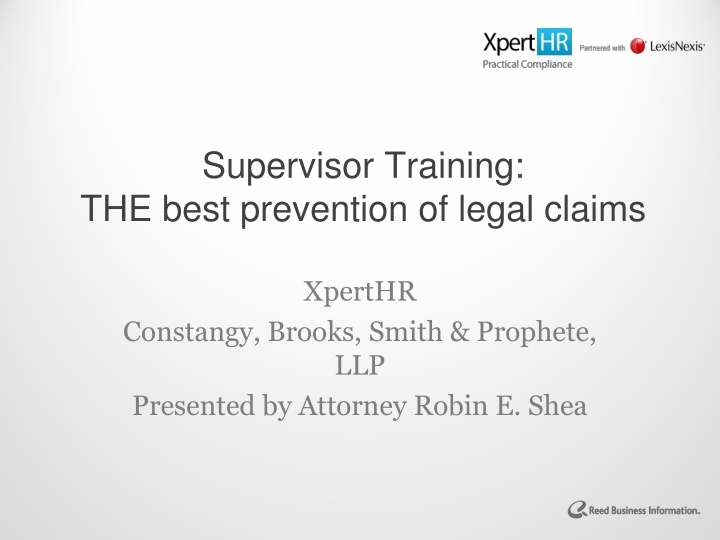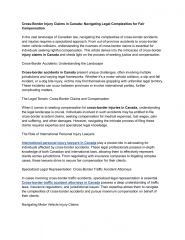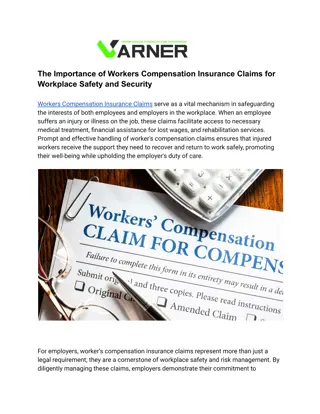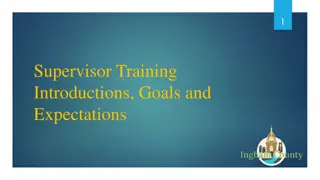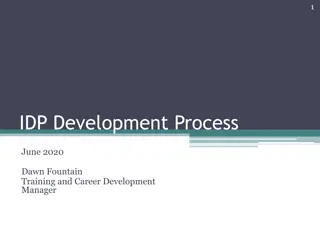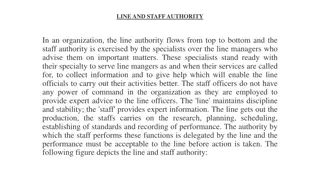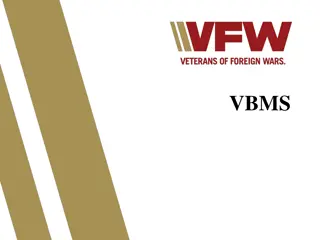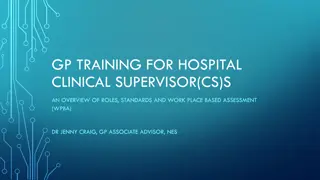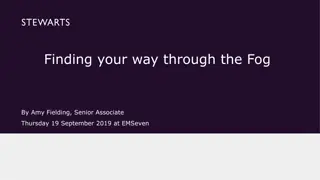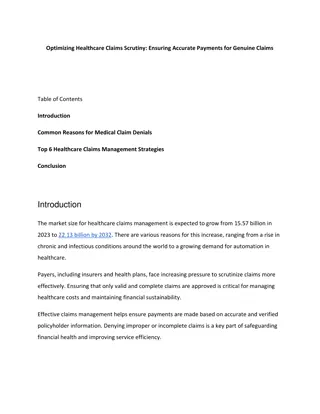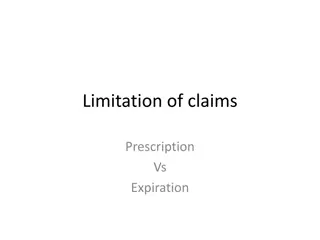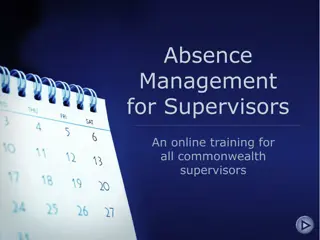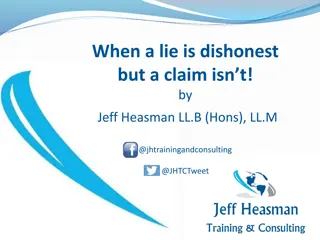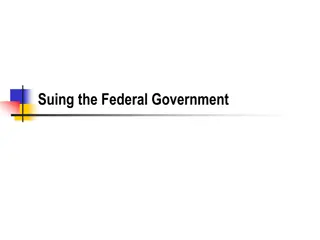Importance of Front-Line Supervisors in Preventing Legal Claims
Front-line supervisors play a crucial role in preventing legal claims and lawsuits within a company. Their direct interaction with employees can significantly impact the company's legal defense. Supervisors are often the first line of defense in handling workplace issues with legal implications, making them essential in minimizing risks and ensuring legal compliance. By equipping supervisors with proper training and knowledge, organizations can strengthen their defense against potential legal challenges.
Download Presentation

Please find below an Image/Link to download the presentation.
The content on the website is provided AS IS for your information and personal use only. It may not be sold, licensed, or shared on other websites without obtaining consent from the author.If you encounter any issues during the download, it is possible that the publisher has removed the file from their server.
You are allowed to download the files provided on this website for personal or commercial use, subject to the condition that they are used lawfully. All files are the property of their respective owners.
The content on the website is provided AS IS for your information and personal use only. It may not be sold, licensed, or shared on other websites without obtaining consent from the author.
E N D
Presentation Transcript
Supervisor Training: THE best prevention of legal claims XpertHR Constangy, Brooks, Smith & Prophete, LLP Presented by Attorney Robin E. Shea
Join the Discussion! @xperthrusa #XHRLive Have a question? Ask us during the presentation using the chat box. 2
Why front-line supervisors are so important They are closest to the employees If supervisor is good, your employees are also probably relatively happy If supervisor is bad, you are likely to get a lot of charges and lawsuits They are usually the members of management to whom employees feel most comfortable talking about workplace issues As your first level of management, their response to a workplace issue can make or break your company s legal defense Often, the supervisor will either have nailed it or blown it before you in HR are even aware, much less your company s lawyers REMEMBER: Your company is usually going to be on the hook for any inappropriate action (or inaction) by a member of your management, and that includes your front-line supervisors.
Why supervisors importance is underrated They re at the bottom of the management hierarchy They rarely have MBAs or law degrees Often, they were chosen for their positions because of their technical expertise and not necessarily for people skills or legal sophistication
Workplace issues with legal implications EEO/discrimination/harassment Retaliation Medical leave/reasonable accommodation (disability and pregnancy) Religious accommodation Union organizing activity, protected concerted activity Military leave Workplace safety and workers compensation Off-clock work by non-exempt employees Favoritism, communication, morale
Supervisors as Companys Best Defense Chances are, your front-line supervisors face one or more of these issues just about every day, whether they realize it or not. If they know how to handle them properly, then your supervisors can be your company s best defense against administrative charges and lawsuits.
A cautionary tale (Chapter 1) Jerry is hitting on a less-senior employee, Marie, and their co- worker Susan observes it. Susan reports the harassment to the supervisor. The supervisor documents Susan s complaint but decides there is no point in acting on it unless Marie makes a complaint herself. Otherwise, he reasons, it might just be malicious gossip.
A cautionary tale (Chapter 2) Six months after Susan s complaint to the supervisor, Marie goes out on a medical leave of absence for depression. After she is out of work for six months, her employment is administratively terminated. Shortly after the termination, the Human Resources Manager is served seemingly out of the blue -- with a lawsuit alleging that Jerry sexually harassed Marie for months, that management knew or had reason to know but took no action, and that as a result Marie has suffered severe emotional distress. The company pays a lot of money to its own lawyers and has to settle the case for six figures.
Could the supervisor have handled this better? You bet. But maybe he didn t know any better.
Whether they need it or not: Topics that should be covered with supervisors on a regular basis EEO/harassment/discrimination/retaliation Positive employee relations FMLA, reasonable accommodation (disability and pregnancy) Religious accommodation Workplace safety (OSHA) Union avoidance (if you want to avoid) and protected concerted activity Workplace bullying
Training Training for front-line supervisors does not have to be overly long or detailed. In fact, it is better to keep it short, and to focus on what they really need to know. (EXCEPTION: Effective harassment training for supervisors, if live and interactive, may take about 2 hours.)
Scared straight. Some supervisors believe that HR is a soft discipline, hate lawyers, and think that legal compliance training is a waste of time. Accordingly, it s a good idea to start with some information about court cases where employers got clobbered because of something that a supervisor did, or failed to do. Other ways to engage supervisors: Humor (but don t try this unless you really do have a good sense of humor) Fact patterns Avoid legal mumbo-jumbo or HR jargon Interactive is good, if at all possible
EEO/discrimination/harassment/ retaliation What s protected, or violates company policy, or is legally actionable Protected categories Examples of behavior that can be considered harassment Examples of legally protected activity High-risk behaviors What to do if you learn or believe, or even suspect, that an employee may have been discriminated against, harassed, or retaliated against Report it immediately Whom to notify Do not try to investigate on your own Do not wait and see whether it gets worse How to avoid retaliating against an employee, and where to get help if you think you re tempted (for example, if the supervisor is named in a charge)
Medical leave/accommodation Most of these decisions should be made by HR, in consultation with the employee s health care provider, so supervisor training can be brief General overview of laws dealing with employee medical conditions (FMLA, ADA, Title VII pregnancy provisions) These laws are very complex, so don t try to handle on your own Refer all requests for FMLA leave, or for reasonable accommodation, to HR If an employee calls in sick, document the verbatim reason given by the employee. (In other words, don t paraphrase it as sick. ) A verbatim reason will make it easier for HR to determine whether the absence is covered under the FMLA.
Religious accommodation Again, can be brief We have laws requiring that employees religious beliefs and practices be reasonably accommodated if (1) they conflict with a workplace requirement, and (2) accommodation will not be an undue hardship for the employer. These laws apply to established religions as well as those that may seem to be fringe. Safest course for a supervisor is to promptly refer all requests for religious accommodation to HR. Don t try to make religious accommodation decisions on your own.
Labor issues Union organizing If you learn of any organizing activity in the workplace, immediately report it to HR or (if applicable) to the company s labor relations representative Do not take action against employees for engaging in organizing activity Protected concerted activity Applies to union AND non-union workplaces Complaints, protests, etc., about terms and conditions of employment may be protected by the National Labor Relations Act, even if posted on social media, company is named, and even if specific managers or supervisors are named Promptly report any such activity to HR or (if applicable) the company s labor relations representative do not try to handle it yourself.
Military leave People who serve in the military have certain legal rights that may not be self-evident Rights apply to voluntary as well as involuntary service Rights apply to National Guard and militia duty, and to Reserve training FMLA also provides rights to employees based on military service It s illegal to discriminate based on military service In addition, employees who serve in the military are legally entitled to a lot of privileges If you have a question or concern, immediately contact HR do not try to handle on your own.
Safety, workers comp Promptly report any alleged workplace injuries or illnesses to the appropriate individual (e.g., Safety Manager) Do not try to determine on your own whether the injury is legitimate If you believe a condition is unsafe, promptly report it to the Safety Manager (or person with responsibility for safety) and work together on rectifying it Do not discriminate or retaliate against employees for reporting safety issues, suffering workplace injuries, or filing workers compensation claims or OSHA complaints When in doubt, consult with your Safety Manager, or with HR.
Off-clock work The Fair Labor Standards Act requires that employees be paid for all hours worked. Breaks should be paid, unless they are about 30 minutes in length or more and the time is really the employee s own. Beware of interrupting non-exempt employees to do work while they re on an unpaid break. The interruption may require the company to pay them. (In short, if you do interrupt, be sure they include that break in their time reports as time worked.) Observe whether non-exempt employees are having to spend time preparing to work before they begin their paid day. If you see a pattern in this regard, consult with HR. Never, under any circumstances, ask a non-exempt employee to work off the clock. Training for supervisors on off-clock work will vary depending on work environment. In office or sales environment, there may be issues with cell phone calls and emails outside of regular work hours. If non-exempt employees are allowed to telecommute, make sure supervisors know the rules and require the employees to accurately post all of their time. If you believe a non-exempt employee is working unauthorized overtime, or performing off-clock work without being asked, promptly report it to HR.
Positive employee relations A good work environment makes it that much less likely that your company will be the subject of a charge or lawsuit. You can t have a good work environment without good supervisors. Communication. Supervisors should understand the importance of positive communication with employees. Avoid drill sergeant style. Let employees know (as permitted by the company) about significant positive events ( the company just got a huge account - yay! ) and negative events ( we re having a pretty bad economic slowdown, and we may have to consider layoffs in the future ). Fairness. Supervisors should avoid even the perception of favoritism. Appreciation. Supervisors should thank employees for doing a good job, and be supportive of employees in other ways (e.g., recognizing personal milestones like birthdays or a new baby, attending funerals of employees close family members, etc.).
What the EEOC says about training The EEOC has issued a report on workplace harassment and an Enforcement Guidance on retaliation, both of which address employment training. In addition to having some very good suggestions, following the EEOC s guidance may help you win a few brownie points with the agency if you get a charge. Harassment guidance: https://www.eeoc.gov/eeoc/task_force/harassment/report.cf m#_Toc453686310 Retaliation guidance: https://www.eeoc.gov/laws/guidance/retaliation- guidance.cfm
EEOC guidance (harassment and retaliation both) Training conducted in plain language, and in language your employees understand Training at all levels including supervisors Training at all types of workplaces not just offices, but also factories, farms, remote locations Training appropriate to the relevant work environment The more interactive, the better Fact patterns, real-life examples
EEOC guidance (harassment training) Don t limit training to legal definitions expand to risky/uncivil behaviors that may not be illegal in themselves Training should be supported at the highest levels of the company Training should be conducted and reinforced on a regular basis EEOC favors live, interactive training (so do I!) Effectiveness of training should be routinely evaluated General civility, and bystander intervention training are also recommended
A caution about civility training I personally love the idea BUT the NLRB is generally opposed to civility requirements for non-supervisory employees If you decide to offer civility training, it s probably best to limit it to employees at supervisory level and higher
What the heck is bystander intervention training ? Make aware of behaviors that are inappropriate Motivate/encourage bystanders to intervene appropriately Teach bystanders HOW to intervene appropriately Provide resources to bystanders TRANSLATION: If you see someone who you think is being harassed and can defuse the situation, then do it. Then promptly report the incident to the appropriate person in HR.
EEOC guidance (retaliation training) Give help to supervisors who are managing employees who ve filed charges or engaged in other protected activity. They are likely to feel angry, hurt, and maybe a little vindictive. They can have the feelings, but they must not act on these feelings. If their feelings are going out of control, make sure they know what to do about it. Make sure that all employment decisions related to a person who has engaged in protected activity are reviewed by HR (and, possibly, legal counsel) before they are administered.
Robin E. Shea Constangy, Brooks, Smith & Prophete Winston-Salem, NC RShea@constangy.com
ThankYou! Contact us at 1-855-XPERTHR or inquiries@xperthr.com Learn more at: http://www.xperthr.com Additional Resources Include: New Supervisor: How to Be Effective in Your Role Conflict Resolution Supervisor Briefing Sexual Harassment Supervisor Briefing
